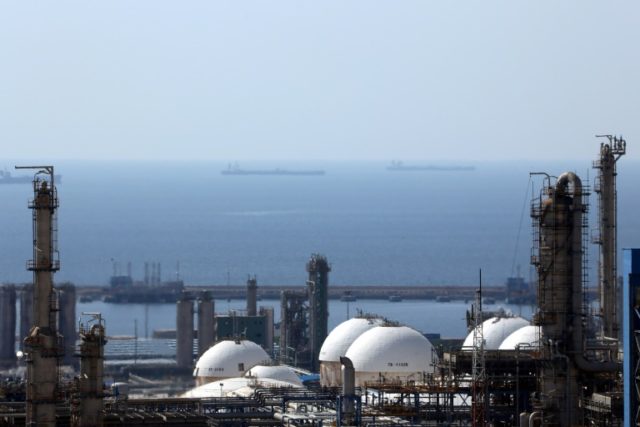The Wall Street Journal noted on Tuesday that the Trump administration’s plan to pressure Iran with renewed sanctions might have one big flaw: China. The Chinese are in a position to buy so much Iranian oil that the effect of isolating Iran from U.S. and European markets will be greatly diminished.
As the WSJ explains, using oil as leverage is a tricky business because the world market is volatile and several national economies are a bit seasick from riding its waves:
In May, President Donald Trump pulled the U.S. out of the 2015 Iran nuclear deal and vowed to reimpose sanctions on Tehran.
Oil prices jumped sharply higher in reaction and if China does take spare Iranian crude that could add to pressure currently pushing crude lower, traders say.
In anticipation of sanctions, foreign oil companies are already exiting Iran and international banks have declined to finance oil trades. While the European Union doesn’t back renewed sanctions, countries including Greece and Turkey, are winding down their purchases.
But China, already the largest buyer of Iranian oil, is gearing up to take more, said the senior official. Tehran is currently in negotiations with Chinese companies to ensure that, according to an Iranian oil official involved in those talks.
“We don’t have any problem selling our oil” to China, the Iranian official said.
The question of just how tightly Europe can be sealed against Iranian oil remains open. Writing at the Hill on Wednesday, Bessma Momani of Canada’s Balsillie School of International Affairs posited that Israel is worried the U.S. will go “soft” on Iran sanctions by offering too many waivers and acknowledging that “some countries will not get to zero Iranian imports, particularly when it comes to Iranian oil.”
There is also the question of how American voters might react to rising oil prices, clearly a major concern of President Donald Trump’s since he has already asked OPEC to increase supply and keep prices down four times this year:
While Trump claims the Saudis have agreed to keep prices low through added supply — though there are conflicting reports on whether the Saudis responded in the affirmative to Trump — the Saudis simply cannot make up for Iran’s supply while also making up the other shortfalls in the market emanating from Venezuela and Libya.
With the global economy projected to grow to nearly 4 percent this year, the demand for oil is likely to increase. Unless President Trump is prepared to tell his base that they will pay more at the pump for squeezing Iran, something will have to give.
This explains why Secretary of Treasury Mnunchin recently reiterated what a spokesperson noted a few weeks ago: Waivers may be given to some countries. Which countries? Well, ones that the U.S. simply doesn’t have leverage over or that would love nothing more than to tee off against the United States in a public spat and are large customers of Iranian oil; namely, China, India and Turkey.
Momani puts it bluntly by saying the U.S. Treasury Department will likely give China waivers to buy Iranian oil because China will simply ignore the sanctions anyway, with India and Turkey not far behind them.
This is not to say that sanctions are doomed to be wholly ineffective. The Economic Times of India pointed out on Wednesday that India’s thirst for oil will make it tough for Prime Minister Narendra Modi to go along with a total ban on Iranian products, but India has already begun realigning its purchases to American suppliers:
Crude imports from the US rose 800 percent month-on-month to 4.72 million barrels in May, the largest volume since at least 2015 for which data is available. India, the world’s fastest growing oil user, could bridge the surplus by up to $4 billion through oil imports alone, government officials said in April.
But there are limitations to how much India can buy from the US at the moment. The US currently has only one export terminal that can accommodate 2-million-barrel supertankers preferred by faraway customers in Asia and expansions at other ports aren’t expected to be completed before 2020.
On the other hand, Germany and France are actively working to subvert American policy by encouraging India to keep buying oil from Iran. The Trump administration has a choice between pushing for the toughest possible sanctions on Iran knowing that many of Iran’s customers will soften the blow by avoiding the sanctions anyway, or issuing plenty of waivers so it looks as though Europe, India, China, and other major players are more or less on the same page as Washington.
Market fluctuations may determine how close the U.S. Treasury can get to its announced goal of “zero” Iranian exports. OilPrice.com noted on Tuesday that a spike in prices in late June caused “some hesitation on the application of Iran sanctions by the U.S.,” while increased production from Libya may have the opposite effect.

COMMENTS
Please let us know if you're having issues with commenting.